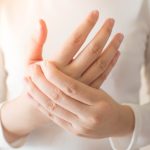What is rosacea?
Rosacea is a common skin condition of the face. There are different types of rosacea:
- erythematotelangiectatic rosacea — broken blood vessels on your nose, cheeks or chin
- papulopustular rosacea — involves papules and pustules (bumps) on your face
- swollen rosacea — the skin on your nose, cheeks, forehead and chin may look like ‘orange peel’
- ocular rosacea — involves your eyes
The cheeks, chin and nose are most often affected. Rosacea is more common in females aged between 30 to 50 years.
Rosacea isn’t contagious (you can’t catch it). There is some evidence that it may be hereditary (genetic).
There’s no cure for rosacea, but there are treatments available that can help control it.
Rosacea isn’t the same as acne. Rosacea can make you feel embarrassed, particularly if it’s left untreated.
What are the symptoms of rosacea?
You may have rosacea if you have:
- frequent blushing, flushing or redness on your cheek, nose, chin or forehead
- redness that looks like sunburn that doesn’t go away
- small visible blood vessels on your face
- bumps or pimples on your face that might sting or burn (most often on your cheeks, chin and nose)

Over time, the redness may last longer.
You may also notice that your skin becomes thicker, especially around your nose. Your nose may also become swollen.
The edges of your eyelids may become:
- red
- sore
- gritty
What causes rosacea?
The cause of rosacea isn’t known. It’s likely that a number of factors are involved, including:
- genetics
- environmental factors
- a reaction to the demodex mite — (a microscopic mite that lives on the skin, also known as the ‘eyelash mite’)
Many people with rosacea find that certain factors can trigger their symptoms.
| This can be the weather: |
|
| Things you eat or drink: |
|
| How you’re feeling: |
|
| Other things, including: |
|
You may want to try keeping a diary to help identify what things trigger your symptoms. This will help you know what to try to avoid.
When should I see my doctor?
If you think you have signs of rosacea you should see your doctor.
Untreated eye rosacea can damage your vision. You should see an ophthalmologist (eye doctor) if rosacea is affecting your eyes.
How is rosacea diagnosed?
Your doctor will take your medical history and look for signs of rosacea on your face. These can be:
- red or flushed facial appearance
- papules and pustules (bumps)
- broken blood vessels
How is rosacea treated?
Unfortunately, there’s no cure for rosacea. However, there are several treatments your doctor or dermatologist (skin specialist) may recommend to help control your symptoms.
First there are some general measures that you can take to help your symptoms.
- Avoid your triggers.
- Use non-irritating skin-care products that are oil free (non-comedogenic).
- Use sunscreen and wear a hat when outside.
- Try to keep your face cool to reduce flushing.
Never use corticosteroid creams or ointments on your face as this will make your rosacea worse.
There are a number of treatments that can help with your symptoms of rosacea. Some of these are topical (you put them on your skin) and others are taken orally (tablets).
Common treatments are:
- metronidazole cream or gel
- azelaic acid
- brimonidine — can reduce redness
- oral antibiotics — can reduce inflammation
- isotretinoin — may be used if antibiotics haven’t worked
Laser treatment may be suggested to treat visible blood vessels or redness. You will need to have multiple treatments. Over time your rosacea will reoccur and you may need to have more laser treatments.
If you have eye symptoms, you may need to see an ophthalmologist (eye specialist).
Can rosacea be prevented?
As we don’t know exactly what causes rosacea, it can’t be prevented.
Complications of rosacea
Rhinophyma (thickening of the skin on your nose) is a possible complication of severe rosacea. It is more common in men. Your nose may get nodules (bumps) and become larger and misshapen.
Rhinophyma can be difficult to treat. You may need medicine, laser remodelling or surgery.
There are no other associated complications of rosacea.



